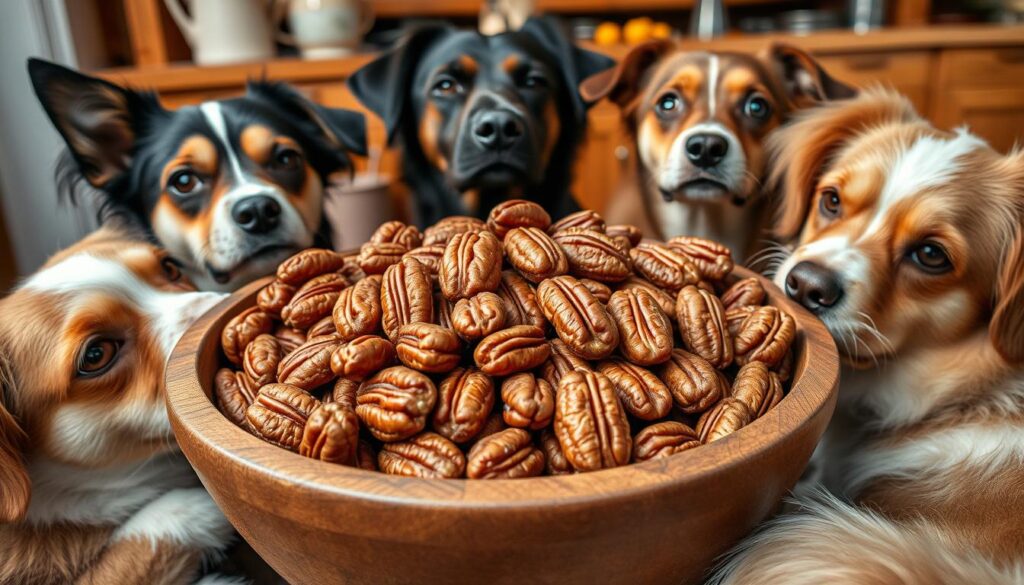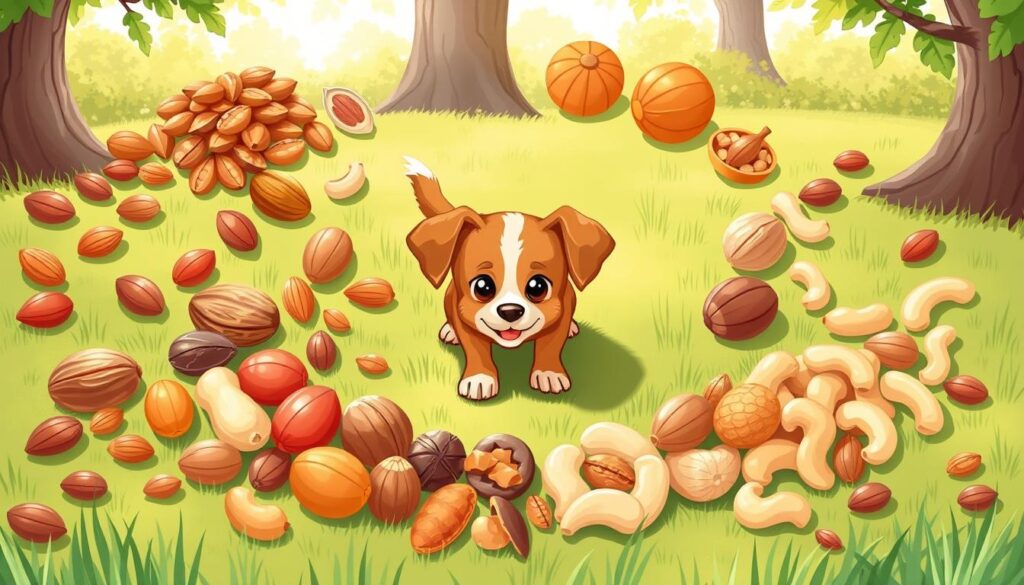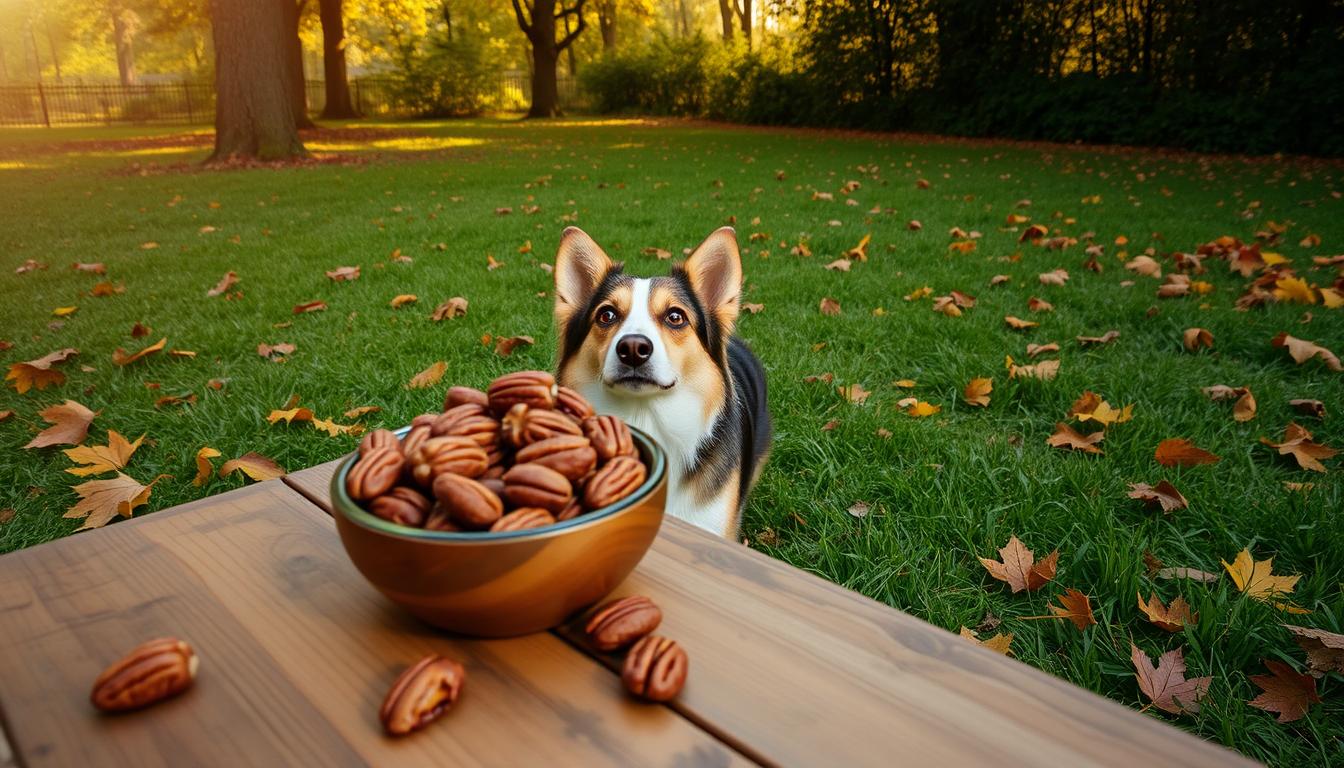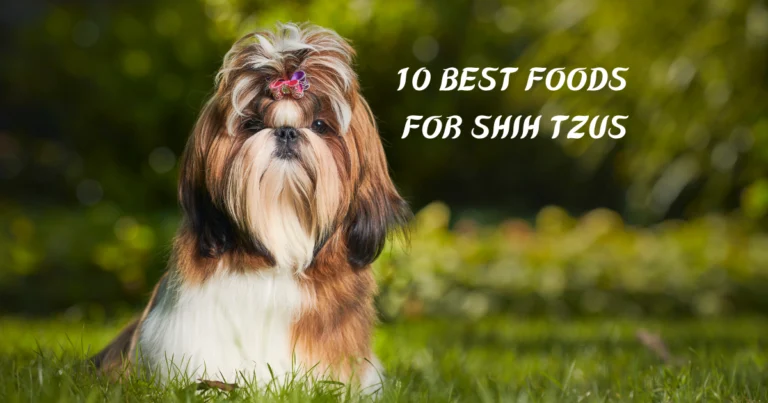Can Dogs Have Pecans? What You Need to Know About Their Safety
As pet owners, we often wonder what human foods are safe for our canine companions. When it comes to nuts, one of the most commonly asked questions is, “Can dogs have pecans?” The answer may surprise you, as pecans can pose significant health risks to our four-legged friends. In this article, we’ll explore the potential dangers of feeding pecans to dogs, the nutritional profile of these nuts, and expert advice on safer snacking options for your furry family member.
Table of Contents
Key Takeaways
- Pecans can be toxic to dogs and should be avoided as a snack.
- Consumption of pecans can lead to various health issues, such as gastrointestinal problems and pancreatitis.
- There are safer nut alternatives that you can offer your dog, such as peanuts and almonds, in moderation.
- It’s important to be vigilant and prevent your dog from accessing pecans, as they may be present in a variety of human foods and baked goods.
- If your dog accidentally ingests pecans, seek immediate veterinary attention to prevent serious complications.
Understanding the Risks of Feeding Pecans to Dogs
Pecans are tasty for humans but can be risky for dogs. They belong to the same group as walnuts and can harm our furry friends. Let’s explore the health problems and toxicity levels of dogs eating pecans.
Common Health Issues from Pecan Consumption
Dogs eating pecans can face several health issues. Pecans are very fatty, which can cause pancreatitis. This is a serious condition that can be life-threatening. They also contain juglone, which can be toxic and cause stomach problems like vomiting and diarrhea.
Toxicity Levels and Warning Signs
The danger of pecans for dogs depends on how much they eat and their size. Even small amounts can be risky. Signs of pecan poisoning include feeling tired, not wanting to eat, shaking, and seizures. If you think your dog has eaten pecans, get help from a vet right away.
| Nut | Toxicity Level for Dogs |
|---|---|
| Pecans | Moderate to High |
| Walnuts | Moderate to High |
In summary, pecans are not safe for dogs. Knowing the risks and signs can help keep your dog safe from harmful treats.

The Nutritional Profile of Pecans
Pecans might not be the best choice for dogs. They are full of good nutrients for humans but not as good for dogs.
Pecans have a lot of fat, about 20 grams per ounce. This can cause stomach problems and pancreatitis in dogs. They also have a lot of calories, which can lead to weight gain.
Pecans also have carbohydrates and natural sugars. Dogs usually do better on a diet with more protein and less carbs.
Even though pecans have good points, it’s important to think about the risks. Always talk to your vet before adding new foods, like pecans, to your dog’s diet.
“The nutritional needs of dogs and humans can vary significantly, so it’s important to be mindful of what we feed our furry companions.”

Knowing the nutritional details of pecans helps you make better choices for your dog’s diet. This ensures they stay healthy and safe.
Can Dogs Have Pecans: Expert Veterinary Advice
It’s important to be careful about what your dog eats. Pecans are tasty and full of nutrients for humans, but dogs should not have them. Veterinary experts say no to dogs eating pecans.
Immediate Actions if Your Dog Eats Pecans
If your dog eats pecans by mistake, act fast. Call your vet or the ASPCA Animal Poison Control Center. They will tell you what to do next, like making your dog vomit or giving them special treatment.
Prevention Tips and Safety Measures
- Keep pecans and pecan products away from your dog.
- Don’t give your dog table scraps or snacks with pecans.
- Teach your family and guests about the dangers of pecans for dogs.
- Choose safe treats and snacks made just for dogs.
Knowing the risks and taking steps to prevent them keeps your dog safe. Remember, can dogs have pecans is a clear no. Keep these nuts away from your dog.
“As a veterinarian, I strongly advise against feeding pecans to dogs. These nuts can pose serious health risks, and it’s simply not worth the potential consequences.”
Your dog’s safety and happiness should always come first. Listen to expert advice and take action to keep your dog healthy and happy. This way, your dog can live a life free from the dangers of what nuts can dogs eat.
Dangerous Components in Pecans for Canines
Feeding pecans to dogs can be risky. Pecans have a compound called juglone, which is toxic to dogs. It can harm their digestive system if eaten in large amounts.
Juglone is found in pecan trees and acts as a defense. But it can cause health problems in dogs. These include stomach issues and more serious conditions.
- Vomiting
- Diarrhea
- Lethargy
- Abdominal pain
- Liver or kidney damage
Pecans also have a lot of fat and calories. This can make dogs gain weight and even cause pancreatitis. Pancreatitis is a serious condition that needs vet care right away.
| Pecan Component | Potential Health Risks for Dogs |
|---|---|
| Juglone | Toxicity, digestive issues, liver/kidney damage |
| High Fat and Calories | Weight gain, pancreatitis |
While pecans might seem like a tasty treat, they’re not safe for dogs. It’s better to choose dog-friendly snacks instead. This keeps your pet safe and healthy.
Safe Nut Alternatives for Your Dog
It’s important to know which nuts are safe for your dog. Pecans can be harmful, but there are many other nuts that are good for them. These nuts can be a tasty and healthy treat for your furry friend.
Healthy Treat Options
Here are some safe and healthy nuts for your dog:
- Almonds: They are full of protein and healthy fats, making them a great snack for dogs.
- Peanuts: Many dog owners choose peanuts because they are rich in niacin and vitamin E.
- Walnuts: Walnuts have omega-3 fatty acids, which are good for your dog’s coat and skin.
- Cashews: Cashews are packed with copper and magnesium, and dogs love their creamy texture.
Proper Serving Sizes
Start with small amounts of new nuts to see how your dog reacts. A good rule is to give no more than a few pieces a day. This depends on your dog’s size and how active they are. Don’t give them nuts that are salted, flavored, or coated, as these can be bad for them.
| Nut Type | Recommended Serving Size |
|---|---|
| Almonds | 2-3 pieces per day |
| Peanuts | 3-4 pieces per day |
| Walnuts | 1-2 pieces per day |
| Cashews | 2-3 pieces per day |
Remember, it’s all about moderation when giving nuts to your dog. If you’re unsure, always talk to your vet for advice.
Signs of Pecan Poisoning in Dogs
As a responsible pet owner, knowing the signs of pecan poisoning in dogs is key. can dogs have pecans and are walnuts dangerous to dogs are important questions for your dog’s health and safety.
If your dog eats pecans, watch for these symptoms of pecan poisoning:
- Vomiting
- Diarrhea
- Abdominal pain or discomfort
- Lethargy or weakness
- Tremors or seizures
- Difficulty breathing
- Increased thirst and urination
The severity of symptoms can vary. It depends on how many pecans your dog ate and their sensitivity. If you think your dog ate pecans, get them to the vet right away. Quick action can save their life.
“Pecan poisoning can be a serious and potentially fatal condition in dogs, so it’s essential to be vigilant and take action if you suspect your dog has eaten pecans.”
Knowing the signs of pecan poisoning and acting fast can protect your dog. Remember, can dogs have pecans and are walnuts dangerous to dogs are key questions for your dog’s safety and health.
The Difference Between Raw and Processed Pecans
When thinking about what nuts dogs can eat, it’s key to know the difference between raw and processed pecans. Raw pecans are more natural but can still be risky for dogs. Processed pecans might have treatments that make them even worse for dogs.
Effects of Various Pecan Preparations
Raw pecans, though less processed, can be hard for dogs to digest. This might cause stomach problems. They also have a lot of fat, which can lead to pancreatitis, a serious condition.
Roasted or salted pecans are even more dangerous. The added seasonings and preservatives can be toxic to dogs.
Hidden Pecan Products to Avoid
- Pecan pies and other baked goods often contain ingredients like xylitol and chocolate, which are highly dangerous for dogs.
- Pecan-based spreads, sauces, and dips may also contain added sugars, oils, and other additives that can harm your dog’s health.
- Candied or glazed pecans are coated in sweet syrups and should be strictly off-limits for your furry friend.
When it comes to what nuts can dogs eat, it’s best to be careful. The risks of pecans, both raw and processed, are too great. Instead, give your dog safer treats that don’t have the dangers found in pecan products.
| Pecan Preparation | Safety for Dogs |
|---|---|
| Raw Pecans | Moderate risk due to high fat content and digestibility issues |
| Roasted or Salted Pecans | High risk due to added seasonings and preservatives |
| Pecan-based Baked Goods | High risk due to toxic ingredients like xylitol and chocolate |
| Candied or Glazed Pecans | High risk due to excessive sugar and syrups |
Remember, your dog’s safety is the top priority. Avoid giving them pecan-based treats or products. Choose dog-friendly snacks to keep your furry friend happy and healthy.
Myths About Dogs and Nuts Debunked
Feeding your dog can be confusing, especially with nuts like pecans. Many owners wonder if these treats are safe. Let’s clear up some common myths about dogs and nuts.
“Are pecans good for dogs?” This is a common question. But, pecans are not good for dogs. They have too much fat and can be toxic. While some nuts like peanuts are okay, dogs should not eat pecans.
- Myth: Pecans are a safe and healthy snack for dogs.
- Fact: Pecans are high in fat and can cause digestive issues, pancreatitis, and even toxicity in dogs.
Many think all nuts are safe for dogs. But, this is not true. What kind of nuts can dogs eat? Not all nuts are safe. While peanuts and almonds are okay in small amounts, others like macadamia nuts and pecans are dangerous.
“It’s important for dog owners to be aware of the specific nuts that are safe and those that should be avoided. Pecans, in particular, can be quite dangerous for our canine companions.”
By understanding the truth, you can make better choices for your dog’s diet. Always put your dog’s health first when it comes to food.
How to Create a Safe Snacking Environment
Keeping your furry friends safe is key. Pecans and other nuts can be very harmful to dogs. With a few easy steps, you can make sure your dogs are safe while they enjoy their treats.
First, keep nuts and other dangerous snacks in pet-proof containers. Use airtight bins or cabinets with locks. Also, teach everyone, especially kids, not to share human food with pets.
In the kitchen, keep it clean and tidy. Quickly clean up spills or crumbs to stop your dog from eating something bad. Make a “dog-free” area in the kitchen for cooking to avoid accidents.
Tips for a Safe Snacking Environment
- Store nuts and other hazardous snacks in secure, pet-proof containers
- Educate all family members about the dangers of sharing human food with pets
- Keep the kitchen clean and clutter-free, wiping up spills and crumbs immediately
- Designate a “dog-free” zone in the kitchen for food preparation
By following these tips, you can make a safe place for snacking for both you and your dogs. Always put your dogs’ health and safety first.
Best Practices for Treating Food-Related Emergencies
Keeping your dog safe is key. Pecans and other nuts can be harmful. Knowing how to act fast is important.
Emergency Veterinary Care Guidelines
If your dog eats nuts, call your vet right away. They’ll tell you what to do next. They might suggest making your dog vomit or giving them activated charcoal.
Going to the vet quickly is vital. Nuts can cause stomach problems, pancreatitis, and worse if not treated.
Home Care Instructions
- Take away any nuts to stop your dog from eating more.
- Watch your dog for signs like vomiting, diarrhea, or pain.
- Do what your vet says for home care, like a special diet.
- Don’t give your dog human food, as it’s not safe for them.
Knowing what nuts can dogs eat and are pecans good for dogs helps in emergencies. Being ready and acting fast keeps your dog safe.
Your dog’s health is most important. If you’re worried, talk to your vet for help and advice.
Conclusion
Pecans can be a risky treat for dogs. They are tasty for humans but not good for dogs. The high fat and calories, plus the risk of toxicity, make them a bad choice.
Instead, give your dog a balanced diet and safe treats. This helps keep them healthy and avoids dangerous health issues. Making smart choices about their food is key.
Always be careful with your dog’s diet. If you’re unsure about what they can eat, talk to your vet. With the right knowledge, you can keep your dog happy and healthy.
FAQ
Can dogs have pecans?
No, it’s not safe to give pecans to dogs. Pecans can be harmful and cause serious health problems.
What kind of nuts can dogs eat?
Some nuts are safer for dogs, like unsalted, raw almonds, cashews, and peanuts in small amounts. But, always check with your vet before adding new foods to your dog’s diet.
Are pecans good for dogs?
No, pecans are not safe for dogs. They have a lot of fat and a toxic compound called juglone. Eating pecans can lead to stomach problems, pancreatitis, and other serious issues.
Are walnuts dangerous to dogs?
Yes, walnuts are dangerous for dogs. They also have juglone, which is toxic. Dogs can get sick from vomiting, diarrhea, and even neurological problems.
What are the signs of pecan poisoning in dogs?
Signs of pecan poisoning include vomiting, diarrhea, and stomach pain. Dogs may also feel very tired or have tremors or seizures. If your dog eats pecans, get them to the vet right away.
ASPCA Animal Poison Control Center



